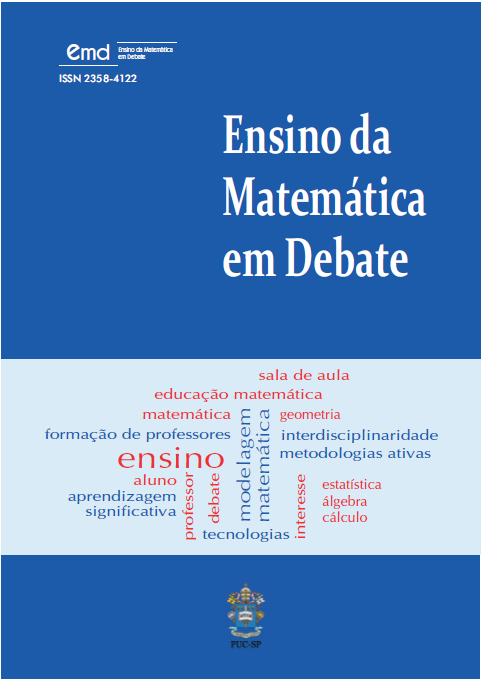Investigating Dyscalculia in the Context of Mathematics Education
Keywords:
Discalculia, Educação Matemática, Formação de Professores, Desenvolvimento Educacional.Abstract
Dyscalculia is considered a reduced ability to understand numerosity, which is the essential property for the concept of number, in which cognitive processes are implicit in these mathematical learning problems. The purpose of this article is to present a descriptive analysis of what has been discussed about dyscalculia in the area of mathematics education. A bibliographic survey was carried out in bibliographic databases with a time frame of the last ten years (2009 to 2018). The search criteria was to select researches (articles, dissertations and theses) in Portuguese, produced in the field of mathematics education, which had the word dyscalculia in the title of the work. The guiding question of this work seeks to answer: What knowledge was produced by research on dyscalculia for the area of mathematics education? The results reveal that the researches aim to promote discussions around the terminology of the dyscalculia concept; the contribution of neuroscience to diagnosis and intervention; the use of play as tools for solving problems; mapping research on dyscalculia; the psychopedagogical intervention and the continuing education of teachers. The intertwining of the areas of education, psychology, health and mathematics education has significantly contributed to the advancement of research aimed at the cognitive development of students with dyscalculia in the educational context.
References
ÁVILA, L. A. B. Avaliação e intervenções psicopedagógicas em crianças com indícios de Discalculia. 280 f. Dissertação (Mestrado em Ciências e Matemática). Pontifícia Universidade Católica do Rio Grande do Sul - PUC-RS. Rio Grande do Sul, 2017.
ÁVILA, L. A. B.; LARA, I. C. M. Discalculia: um mapeamento de artigos brasileira. Abakos, Belo Horizonte, v. 6, n. 1, p. 35-56, nov., 2017.
BUTTERWORTH, B. The Mathematical Brain. London: Macmillian Publishers, 1999.
BUTTERWORTH, B. The development of arithmetical abilities. Journal of Child Psychology and Psychiatry. p. 3-18, 2005.
BUTTERWORTH, B. Dyscalculia from Science to Education. New York, Routledge, 2019.
CARMO, J. S.; SIMIONATO, A. M. Reversão de ansiedade à matemática: alguns dados da literatura. Psicologia em estudos. vol. 17 n. 2 Maringá, abr./jun. 2012.
DANYLUK, O. S. Alfabetização Matemática: as primeiras manifestações da escrita infantil. 5. ed. Passo Fundo, RS: Editora Universidade de Passo Fundo, 2015.
DEHAENE, S Cerebral bases of number processing and calculation. In: GAZZANIGA, M.S. The new cognitive neuroscience. 2 eds. Institute of Technology, Massachussets, 2000.
DEVINE, A. Cognitive and emotional mathematics learning problems in primary and secondary school students. Doctoral thesis, University of Cambridge, Cambridge, Serie serienummer, 2017.
HAASE, V. G.; MOURA, R. J.; CHAGAS, P. P.; WOOD, G. Discalculia e Dislexia: Semelhança epidemiológica e diversidade de mecanismos neurocognitivos. ALVES, Luciana Mendonça; MOUSINHO, Renata; CAPPELINI, Simone Aparecida. Dislexia novos tempos e novas perspectiva, Publisher: Rio de Janeiro: Editora Wak, pp. 257-282, 2011.
HARRIS, J. C. Developmental Neuropsychiatry: Assessment, Diagnosis, and Treatment of developmetal disorders. New York: Oxford University Press, cop, vol. II, 1998.
KAUFMANN, L.; MAZZOCCO, M.M.; DOWKER, A.; VON ASTER, M.; GÖBEL, S. M.; GRABNER, R.H.; HENIK, A.; JORDAN, N.C.; KARMILOFF-SMITH, A.D.; KUCIAN, K.; RUBINSTEN, O.; SZUCS, D.; SHALEV, R.; NUERK, H.C. Dyscalculia from a developmental and differential perspective. Front. Psychol. 4:516, ago 2013.
KAHN, H. J.; WHITAKER, H. A. Acalculia: An Historical Review of Localization. In: Brain and Cognition, V. 17, p. 102-115, 1991.
LARA, I. C. M.; FRARE, J. P. N.; AVILA, L. A. B.; PIMENTEL, L. S. A resolução de algoritmos de adição e subtração apresentada por crianças com indícios de discalculia. Anais do VII Congresso Internacional de Ensino da Matemática, ULBRA – Canoas – Rio Grande do Sul, 2017.
MAJDALANI, L. A. Uma análise da compreensão do conceito de número para um discalcúlico. 2018, 74 f. Dissertação (Mestrado Profissional em Matemática em Rede Nacional). Colégio Pedro II. Rio de Janeiro, 2018.
MORAES, R.; GALIAZZI, M. C. Análise Textual Discursiva. 2. ed. Ijuí: Editora Unijuí, 2011.
PIMENTEL, L. S. Possíveis indícios de discalculia em Anos Iniciais: uma análise por meio de um Teste piloto de Matemática. (Mestrado em Educação em Ciências e Matemáticas). 2015, 162 f. Pontifícia Universidade Católica do Rio Grande do Sul - PUC-RS. Rio Grande do Sul, 2015.
PIMENTEL, L. S.; LARA, I. C. M. Discalculia: mapeamento das produções brasileiras. Anais do VI Congresso Internacional de Ensino da Matemática, ULBRA – Canoas – Rio Grande do Sul, 2013.
SANTOS, F. H. Discalculia do desenvolvimento. 1ed. São Paulo, SP: Pearson Clinical Brasil, 2017.
SILVA, P. A. S.; SANTOS, F. H. Discalculia do desenvolvimento: avaliação da representação numérica pela ZAREKI-R. Psicologia: Teoria e Pesquisa. vol.27 n.2 Brasília abr./jun. 2011.
SILVA, M. A. Discalculia e aprendizagem de matemática: um estudo de caso para análise de possíveis intervenções pedagógicas. 2016, 97 f. Dissertação (Mestrado Profissional em Matemática em Rede Nacional). Universidade Federal Rural do Rio de Janeiro, Rio de Janeiro, 2016.
SZÜCS, D.; GOSWAMI, U. Developmental dyscalculia: Fresh perspectives. Trends in Neuroscience and Education, v. 2, I. 2, p. 33-37, jun., 2013.
THIELE, A. L. P. Discalculia e formação continuada de professores suas implicações no ensino e aprendizagem de matemática. 2017, 153 f. Dissertação (Mestrado em Educação em Ciências e Matemáticas). Pontifícia Universidade Católica do Rio Grande do Sul. PUC-RS, 2017.
VILLAR, J. G. Discalculia na sala de aula de matemática: um estudo de caso com dois estudantes. 2017, 166f. Dissertação (Mestrado Profissional em Educação Matemática).
Downloads
Published
How to Cite
Issue
Section
License
Copyright (c) 2021 Ana Maria Antunes de Campos, Ana Lúcia Manrique

This work is licensed under a Creative Commons Attribution 4.0 International License.






